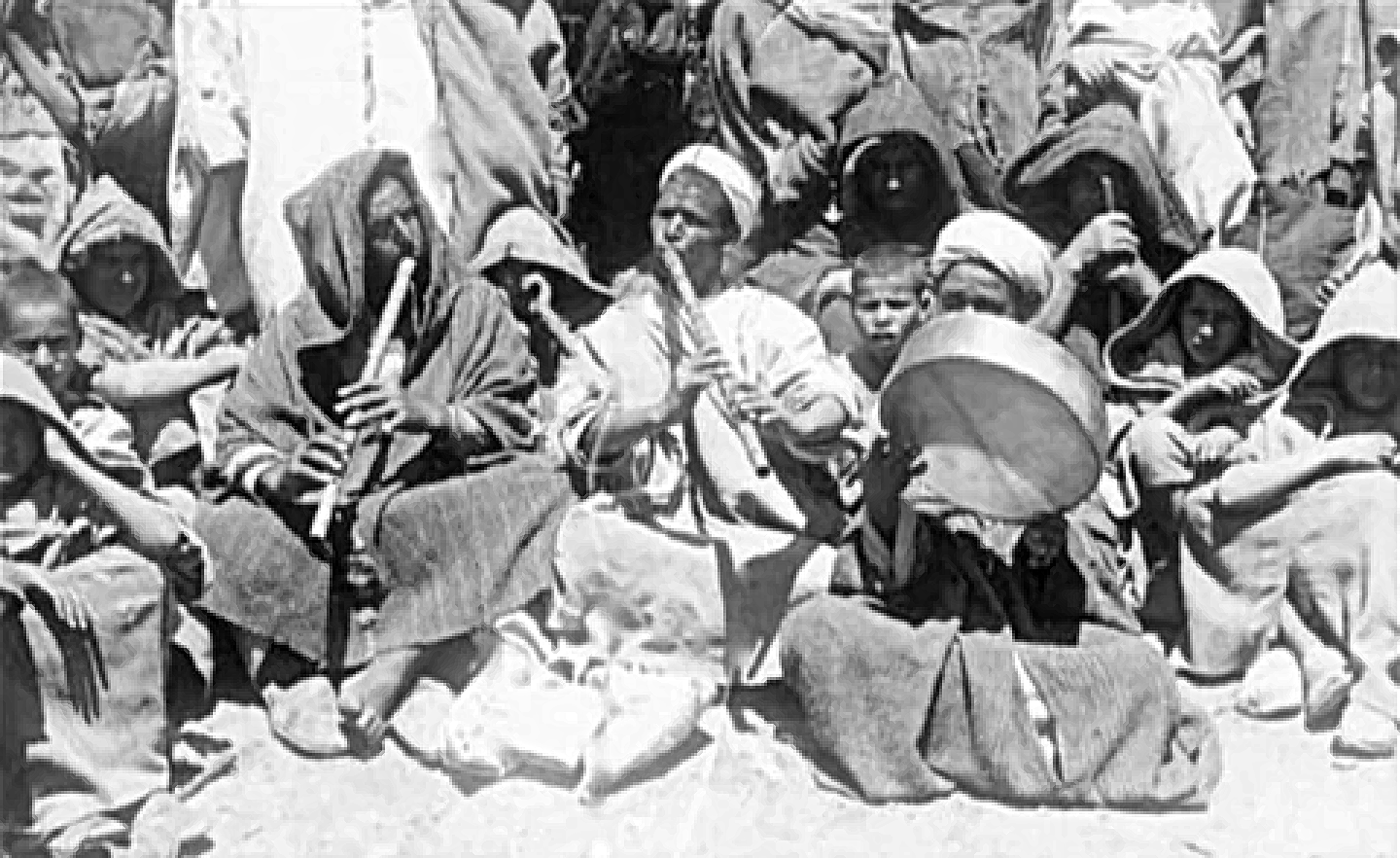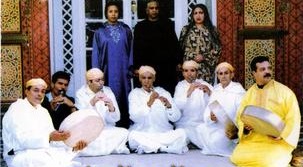Jilala on:
[Wikipedia]
[Google]
[Amazon]

 The Jilala (), or Tariqa Jilalia () is an
The Jilala (), or Tariqa Jilalia () is an
They are called, behind monetary compensation, upon to exorcise evil spirits, to purify the heart and for curing to heal the sick (in particularly useful in curing cases of hysteria and depression), through the invocation of saints and spirits. In a ritual Jilala the ''
Abdelkader Ben Mouiha, Jilala of Fes. Extract from 'Sufi Soul' documentary (DVD extra), 2005
* Abdelkader Ben Mouiha, Jilala of Fes. Some recordings of the ancient repertoire of Jilala brotherood, 1994
Sufi orders Sufism in Morocco Sufi music Islam in Morocco Moroccan Sufi orders

 The Jilala (), or Tariqa Jilalia () is an
The Jilala (), or Tariqa Jilalia () is an ecstatic
Ecstasy () is a subjective experience of total involvement of the subject, with an object of their awareness. In classical Greek literature, it refers to removal of the mind or body "from its normal place of function."
Total involvement with ...
and music-therapeutic tariqa
A tariqa (or ''tariqah''; ar, طريقة ') is a school or order of Sufism, or specifically a concept for the mystical teaching and spiritual practices of such an order with the aim of seeking ''haqiqa'', which translates as "ultimate truth".
...
of Morocco
Morocco (),, ) officially the Kingdom of Morocco, is the westernmost country in the Maghreb region of North Africa. It overlooks the Mediterranean Sea to the north and the Atlantic Ocean to the west, and has land borders with Algeria t ...
of Sufi origin. It should not be confused with the folk revival group Jil Jilala
Jil Jilala ( ''Generation of Majesty'') is a Moroccan musical group which rose to prominence in the 1970s among the movement created by Nass El Ghiwane and Lem Chaheb. Jil Jilala was founded in Marrakech in 1972 by performing arts students Mohame ...
.
The Jilala are the oldest Moroccan Muslim confraternity, named after the Sufi master Abdul Qadir Gilani, in Morocco called Moulay Abdelkader Jilali or Boualam Jilali (Bū 'alam Jilali).
The rituals of Jilala ranging the dhikr
''Dhikr'' ( ar, ذِكْر}, , also spelled ''Zikr'', ''Thikr'', ''Zekr'', or ''Zikar'', literally meaning "remembrance, reminder" or "mention") is a form of Islamic meditation in which phrases or prayers are repeatedly chanted in order to remem ...
and invocation of marabout
A marabout ( ar, مُرابِط, murābiṭ, lit=one who is attached/garrisoned) is a Muslim religious leader and teacher who historically had the function of a chaplain serving as a part of an Islamic army, notably in North Africa and the Sah ...
s and jinn
Jinn ( ar, , ') – also romanized as djinn or anglicized as genies (with the broader meaning of spirit or demon, depending on sources)
– are invisible creatures in early pre-Islamic Arabian religious systems and later in Islamic mytho ...
s, just like the other tranche confraternity of Morocco (Gnawa
The Gnawa (or Gnaoua, Ghanawa, Ghanawi, Gnawi'; Arabic: ڭناوة) are an ethnic group inhabiting Morocco.
The name Gnawa probably originated in the indigenous language of North Africa and the Sahara Desert. The phonology of this term accordi ...
, Hmadsha and Aissawa).
The Jilala operate in small groups, usually less than five people. The musical instruments they use are the gasba
''Gasba'' or ''tamja'' is a musical style based on a wind instrument of the same name, (''gasba'' literally means "reed" in the Berber language), which is widespread in Tunisia, Algeria (among Chawis of north-east Algeria and Oran in the northwes ...
flute (bamboo red flute) and bendir, those using bendir generally are also those who make the invocations and chants. When it comes to songs in honor of a type of spirits called ''buwwāb'' (black African jinn, traditionally associated to the Gnawa), some Jilala also use the krakebs
Qraqeb or garagab ( ar, قراقب), in English often transliterated as krakeb, are a large iron castanet-like musical instrument primarily used as the rhythmic aspect of Gnawa music. Gnawa today is part of the North African culture and is inhe ...
, the typical large iron castanets of the Gnawa.
Originally only a voice of sacred Moroccan sufism, and in their early repertoire, besides the invocation of saints and the jinn and the songs of praise of Allah, have a gripe songs of exile and death, and for this reason the musical style of this confraternity is melancholic. The Jilala Jilala music is all about throb and rasp. Throb - the acceleration and deceleration within a song, the breathy organic timbre of the gasba flutes, the in-and-out-of-phase frequencies of the paired flutes. Rasp - flutes, voices, bendirs, all buzzy. The bendir patterns inhabit the 2/4 and 6/8 universes common across Morocco, but I find the drum stroke patterns particularly loopy and provocative.They are called, behind monetary compensation, upon to exorcise evil spirits, to purify the heart and for curing to heal the sick (in particularly useful in curing cases of hysteria and depression), through the invocation of saints and spirits. In a ritual Jilala the ''
lila Lila or LILA may refer to:
Arts and entertainment
* ''Lila'' (album), debut album by American country music singer Lila McCann
* ''Lila'' (movie), a 1968 sexploitation film
* The Meaning of Lila, a comic strip written by John Forgetta and L. A. ...
'' is performed. The therapy or exorcism must be repeated every year in the same period. It is thought that if the therapy is not renewed, the sick or possessed the same symptoms recur at the approach of the date corresponding to the first crisis. In the time that elapses between two ''lila'', however, the symptoms disappear, or, at least, are kept under control.
The participants in the rituals, especially women, falling into a trance (''hal''), dancing wildly (''jadba'' or ''jedba'') to the rhythm of flutes and ''bendir''. I fell into a trance can have different behavior, such as laughter, screams, cries. The Jilala have spread throughout Morocco (excluding Western Sahara
Western Sahara ( '; ; ) is a disputed territory on the northwest coast and in the Maghreb region of North and West Africa. About 20% of the territory is controlled by the self-proclaimed Sahrawi Arab Democratic Republic (SADR), while the ...
), especially in the north and in the region of the city of Casablanca.
There are similarities between the rituals of Jilala and other therapeutic-Moroccan musical groups with the phenomenon of Italian
Italian(s) may refer to:
* Anything of, from, or related to the people of Italy over the centuries
** Italians, an ethnic group or simply a citizen of the Italian Republic or Italian Kingdom
** Italian language, a Romance language
*** Regional Ita ...
tarantism
Tarantism is a form of hysteric behaviour originating in Southern Italy, popularly believed to result from the bite of the wolf spider '' Lycosa tarantula'' (distinct from the broad class of spiders also called tarantulas).
A better candidate c ...
, for example the release and wild dance, the fact that the therapy has to be renewed each year, the fact that healers are musicians, and it gives a therapeutic value to the colors, the music and dance.
See also
*Gnawa music
Gnawa music (Ar. ) is a body of Moroccan religious songs and rhythms. Its well-preserved heritage combines ritual poetry with traditional music and dancing. The music is performed at ''lila'', communal nights of celebration dedicated to prayer ...
References
{{ReflistExternal links
Abdelkader Ben Mouiha, Jilala of Fes. Extract from 'Sufi Soul' documentary (DVD extra), 2005
* Abdelkader Ben Mouiha, Jilala of Fes. Some recordings of the ancient repertoire of Jilala brotherood, 1994
Sufi orders Sufism in Morocco Sufi music Islam in Morocco Moroccan Sufi orders